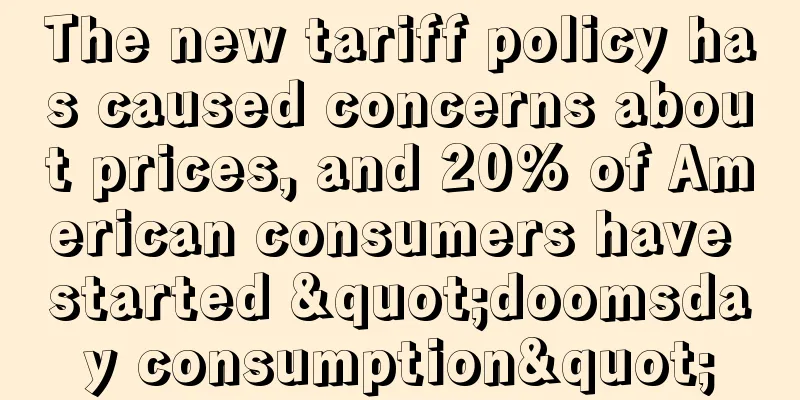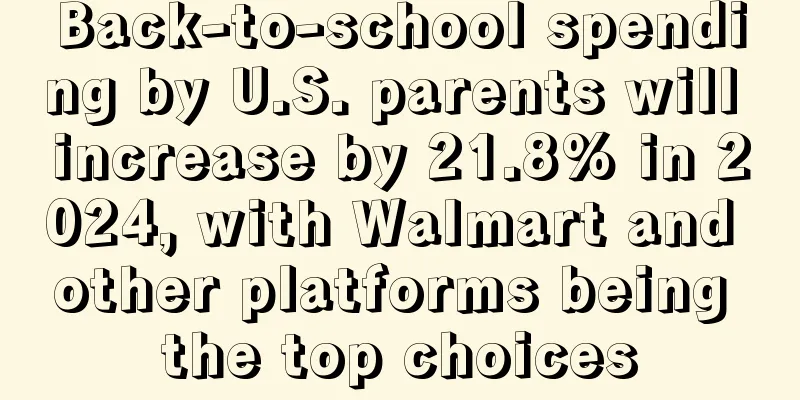The new tariff policy has caused concerns about prices, and 20% of American consumers have started "doomsday consumption"

|
Recently, according to foreign media reports, according to the latest report from Credit.Cards.com, one in five Americans said that out of concern for future events, they are engaging in so-called "doomsday consumption", that is, excessive purchases of goods to cope with possible price increases or recurrence of the epidemic. This consumption behavior reflects consumers' anxiety about future economic uncertainty, especially under the new tariffs implemented by President Trump and the possible impact of the epidemic. The survey shows that since November last year, a quarter of Americans have made large purchases due to concerns about the Trump administration's new tariffs, and 21% said they plan to make such purchases as soon as possible. For consumers who have purchased large items, the most common items include electronics (39%), household appliances (31%), and home improvement materials (25%). In addition, furniture (22%) and cars (17%) have also become major purchases. The report also pointed out that 30% of Americans said they were preparing for another possible epidemic, and 42% of respondents said they had begun to stockpile items, mainly food and toilet paper. Other common hoarding items include non-perishable food (76%), toilet paper (72%), medical supplies (49%) and over-the-counter drugs (44%). Some consumers also bought water filtration systems (21%), household goods or appliances (23%), and personal care products (25%). It is worth noting that more and more American consumers tend to use credit cards for shopping. 28% of consumers said they use credit cards for most of their purchases, 37% use credit cards for some of their purchases, and 35% do not use credit cards for their purchases. For those consumers who use credit cards, 34% said they may fall into credit card debt during their consumption this year to ensure that they can complete these large purchases. CreditCards.com expert John Egan said that although it is difficult to assess the specific impact of the Trump administration's new tariffs on consumer spending, these tariffs are likely to prompt some consumers to re-examine their purchasing habits, especially when it comes to purchasing major commodities. Overall, doomsday consumer behavior reflects the strong concerns of American consumers about future uncertainties. This trend not only affects their consumption patterns, but also changes the pattern of market demand to a certain extent. Experts warn that although the current increase in consumer spending may provide short-term economic stimulus, in the long run, this behavior may aggravate household debt problems and affect the stability of the consumer market. Author ✎ Rayna/ Statement: This article is copyrighted and may not be reproduced without permission. If you need authorization, please contact: happy |
<<: 13,000 dryers sold on Amazon and other platforms have been recalled! There is a fire hazard
Recommend
Sellers are shocked! Amazon suddenly announced: FBA non-essential products will no longer be accepted!
Just now, a picture caused a stir in the seller co...
Amazon takes action on low-priced products and helps sellers grab orders at its own expense!
According to Deloitte's latest forecast, e-com...
What is Craigslist? Craigslist Review
Craigslist is a large-scale free classified advert...
What is VMLogin? VMLogin Review
VMLogin Chinese version anti-association fingerpri...
Noon platform investment sharing! Let's dig into the 10 billion e-commerce market in the Middle East!
background Noon is a joint venture between Emaar ...
U.S. Black Friday and Cyber Monday sales may reach $75 billion, with sales growth slowing to 3%
It is learned that recently, S&P Global Rating...
Should I fake orders when doing business on Amazon?
Should we fake orders when doing cross-border e-co...
What is Grailed? Grailed Review
Grailed is a second-hand luxury menswear resale we...
What is Shopee Fans? Shopee Fans Review
Shopee Fans is a Shopee operation tool and a plug-...
Big event of the week! Former Amazon executive: The platform chose counterfeit goods
Amazon launches free online music service US e-co...
What is Amazon Exclusives? Amazon Exclusives Review
The Amazon Exclusives program is a service launche...
What is Thunderbird Cloud Business? Thunderbird Cloud Business Review
Zhejiang Thunderbird Supply Chain Management Co., ...
What is Bulbulshop? Bulbulshop Review
Bulbulshop is a shopping e-commerce app that offer...
Amazing! Tiktok has become so popular!
recently, NASA 's SpaceX Crew-4 mission launch...
Do you understand Amazon’s product selection principles?
We all know that there is a "28 rule" f...







![[Must-read for product selection] Amazon product selection data analysis idea that is easy to produce hot products is launched online](/upload/images/67e775fd186b3.webp)

